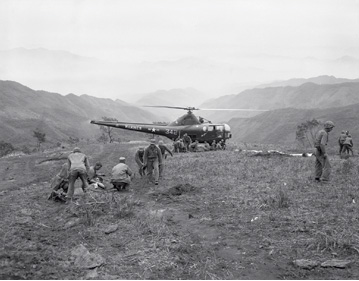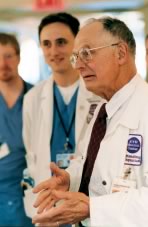 |
|||||||||||||||||

|
While serving in the Marine Corps during the Korean War, Frank Spencer ('44) was dismayed to see a soldier scheduled for a leg amputation. Doctors had ligated, or bound, a bleeding artery in the thigh after the soldier was hit by shrapnel, and gangrene had set in. Spencer, a 26-year-old surgeon, had learned to repair arteries during training at Johns Hopkins and the University of California at Los Angeles medical centers. He knew he could repair such injuries in wounded soldiers. Unfortunately, the military in Korea was still using the same medical methods used in World War II, when soldiers often didn't see doctors until eight hours after injury and arterial repair could not be attempted because it was too dangerous for patients by then. Knowing that wounded soldiers in Korea saw doctors much sooner thanks to the use of helicopters, Spencer sought permission from the military to repair arteries on a trial basis.
After three weeks without any answer, he assembled surgical teams in two medical units behind the combat zone and risked court-martial by spending the next nine months treating about 100 arterial injuries. "I could not live with myself if I was forced to take someone's leg off when it was not necessary," he says. Spencer successfully treated between 80 and 90 percent of his patients. Instead of a court martial, the young surgeon earned the Legion of Merit Award and fame after a reporter interviewed him about his work and the story went out on three wire services. "I became a ‘boy hero,' much to my embarrassment," he says. "But arterial repair in Korea benefited more people than anything I've ever done."
Spencer's work in Korea was the first of many accomplishments during his 52-year career in medicine -- success that he says he may not have achieved without the support of his professors at North Texas and others who helped him realize his dream of graduating from college. "I have contempt for arrogance," he says. "I thank the good Lord for giving me a good brain, access to good education and teachers who truly wanted me to succeed. I arrived at North Texas knowing nobody, but, fortunately, it was a school tradition for teachers to have deep interest in their students." As a farm boy in rural Haskell County in West Texas, Spencer dreamed of becoming a physician like his paternal grandfather. His parents supported his dream by teaching him how to read, spell and do multiplication tables at a young age. When Spencer enrolled in the local two-room school at age 6, he was placed in the second grade instead of the first -- but only for a week until he was moved to the third-grade class. "It was a striking tribute to my mother's educating a preschool child," he says. Even with his intelligence, however, the odds were against Spencer going to college and medical school. Less than 10 percent of high school graduates in the county went to college. Most worked on their parents' farms after graduation. Spencer's own father had left college when Spencer's grandfather died suddenly and left the family with numerous debts and no income. "My father started farming and was never able to return to college. This remained a lifelong frustration," Spencer says. "He was determined to make it possible for me to go to college." But when Spencer visited a local physician for advice about college applications, "I was told to stop dreaming and be a farmer," he recalls. "This made my father very angry," he says. Fortunately, another person helped Spencer realize his dream -- his high school science teacher, who was attending graduate school at North Texas the summer after Spencer graduated from high school. The teacher invited Spencer to visit him on campus. One month later, Spencer was a 15-year-old North Texas student, majoring in chemistry.
Once he was at North Texas, Spencer landed a part-time job at a soda shop near campus, earning 25 cents an hour. Greater opportunities soon came his way after James L. Carrico, chair of the Department of Chemistry, noticed him. "Dr. Carrico picked out freshmen who seemed to have potential. I became his laboratory assistant. It was so enjoyable that I thought about being a chemist instead of a physician for a while," he says. He calls Carrico "one of the most talented teachers I have encountered in my entire career." "He instilled the students with the excitement of learning and combined this with a warm paternalism, virtually adopting many of them as foster children," he says. Another faculty member, psychology professor Merl E. Bonney, "absolutely mesmerized" him with his knowledge. "For a while, I thought I'd be a psychiatrist. I even bought six or eight textbooks on the subject," Spencer says. He also recalls Myrtle Brown, a "quiet mathematics teacher" who pointed him to a scholarship for a summer camp for high-achieving college students. After winning the scholarship, Spencer told Brown he would hitchhike to the camp in Wisconsin. "She gave me a train ticket that took me as far as Chicago," he says. Spencer says the high quality of teaching at North Texas, combined with a farming background that made him "an incurable workaholic," led to him finishing his bachelor's degree in only two and half years. He applied to the two medical schools that were in Texas at the time, but both rejected him. "My grades were excellent, but because I was only 17, they would not accept me for another year," he says. "This created a very serious problem. I had already obtained an officer's commission in the Navy that would become effective upon acceptance to medical school. Without a medical school acceptance, the commission would become invalid and I would be eligible for the military draft." Fortunately, Spencer heard of another medical school -- Vanderbilt School of Medicine in Nashville -- from a fellow chemistry student. He applied and was accepted in three weeks, "with no comments about my age." At Vanderbilt, Spencer enjoyed his required surgical rotation and graduated at the top of his class. While attending Johns Hopkins for his internship, he became interested in heart surgery through the influence of the director of the university's Department of Surgery, Alfred Blaylock. Blaylock had successfully performed the first "blue baby" surgery in 1944, operating on an infant with a congenital heart malformation that robs the blood of oxygen.
After Spencer completed military service and surgical training, he joined the Johns Hopkins faculty for six years. In 1961 he moved to Lexington, Ky., to launch the University of Kentucky medical school and, five years later, accepted the position of chair of surgery at New York University.
Spencer became a pioneer in coronary bypass at NYU and also began its cardiac surgery program. He retired as chair in 1998 but remains active on the NYU faculty. Named a North Texas Distinguished Alumnus in 1978 and honored by the Department of Chemistry in 2000, he has served as president of the American College of Surgeons, the American Surgical Association and the American Association for Thoracic Surgery. He's one of only a handful of U.S. surgeons elected to all three offices in the past 70 years. But he's equally proud of his commitment to students. He continued the North Texas tradition of faculty interest in students with his own students at NYU, memorizing their faces and names over decades. "In my professional career, I refused to take a position that didn't involve teaching, because much of my good fortune comes from teachers who cared about me and wanted me to succeed," Spencer says. "I hope that my good fortune, which evolved from very modest circumstances, has shown students what it is possible to achieve."
| ||||||||||||||||||||||

